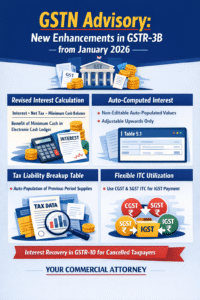The Central Board of Indirect Taxes and Customs (CBIC) has issued Circular No. 248/05/2025-GST on March 27, 2025, addressing various concerns regarding the implementation of Section 128A of the CGST Act, 2017. This circular aims to provide clarity on availing benefits related to waiver of interest and penalty on tax demands raised under Section 73 for the period from July 1, 2017, to March 31, 2020. Below is a detailed analysis of the key provisions and clarifications provided in the circular.
Background and Context
Following the recommendations of the 53rd and 54th GST Council meetings, the Government introduced Section 128A in the CGST Act, 2017, effective from November 1, 2024. Alongside, Rule 164 was inserted in the CGST Rules, 2017, to outline the procedure for availing waivers of interest and penalties related to tax demands under Section 73.
Subsequently, Circular No. 238/32/2024-GST, dated October 15, 2024, was issued to clarify the operational aspects of Section 128A. However, certain ambiguities persisted, leading to the issuance of the present circular to address concerns raised by taxpayers and trade bodies.
Key Issues and Clarifications
1. Eligibility for Benefit under Section 128A When Payment is Made via FORM GSTR-3B Instead of FORM GST DRC-03
Concern Raised:
Taxpayers sought clarity on whether payments made via FORM GSTR-3B before the implementation of Section 128A (i.e., prior to November 1, 2024) would be eligible for the benefit.
Clarification Provided:
- Payments made through FORM GSTR-3B before November 1, 2024, for demands under Section 73 will be considered as payments towards the tax liability under Section 128A.
- Rule 164(1) mandates that to avail of the benefits post-November 1, 2024, payments should be made through FORM GST DRC-03.
- Rule 164(2) further stipulates that payments must be credited to the electronic liability register before availing the benefits.
- Therefore, taxpayers who have already paid their dues via FORM GSTR-3B before November 1, 2024, are eligible for the benefits of Section 128A, subject to verification by the proper officer.
2. Withdrawal of Appeals and Tax Discharge for Periods Partially Covered Under Section 128A
Concern Raised:
Taxpayers receiving notices covering periods both within and outside the purview of Section 128A sought clarification on:
- Whether the entire tax demand must be discharged.
- Whether the appeal must be withdrawn for the entire period covered in the notice.
Clarification Provided:
- Rule 164(4) and Rule 164(7) have been amended to allow partial settlement.
- Taxpayers can file an application under FORM SPL-01 or FORM SPL-02 after settling liabilities for periods eligible under Section 128A (FY 2017-18 to FY 2019-20).
- Once the application is submitted, the taxpayer must inform the Appellate Authority or Tribunal that they do not intend to pursue the appeal for the covered period.
- The Appellate Authority or Tribunal will pass appropriate orders for periods beyond the eligible timeframe under Section 128A.
- This provision provides relief to taxpayers from unnecessary legal proceedings for non-qualifying periods.
Withdrawal of Earlier Clarification:
The clarification issued in Point 6 of the Table at Para 4 of Circular No. 238/32/2024-GST (dated October 15, 2024) has been withdrawn to align with the new provisions.
Implications of the Circular
- Enhanced Clarity for Taxpayers: The circular provides much-needed certainty on procedural aspects, reducing ambiguity and potential litigation.
- Ease of Compliance: By allowing pre-existing payments via FORM GSTR-3B to be counted towards the benefit, taxpayers are relieved of additional procedural burdens.
- Flexibility in Appeal Withdrawal: The amendments ensure that appeals do not need to be withdrawn in entirety but only for the periods relevant under Section 128A.
- Uniformity in Implementation: Field formations across India will now have standardized guidelines, preventing arbitrary interpretations of the law.
Next Steps for Taxpayers
- Verify Previous Payments: If payments were made via FORM GSTR-3B before November 1, 2024, ensure they are properly accounted for under Section 128A.
- File Required Forms: For cases involving mixed periods, file FORM SPL-01 or FORM SPL-02 as applicable.
- Liaise with Appellate Authorities: If withdrawing appeals for covered periods, notify the authorities to avoid unnecessary legal entanglements.
- Stay Updated: Follow CBIC notifications and trade circulars for further guidance on compliance under Section 128A.
Conclusion
The latest GST circular offers substantial relief and procedural simplifications for taxpayers availing benefits under Section 128A of the CGST Act, 2017. By addressing key issues related to payment mechanisms and appeals, the Government has reinforced its commitment to streamlining GST compliance and reducing litigation. Taxpayers should proactively assess their eligibility, comply with the prescribed procedures, and take necessary actions to optimize their benefits under this provision.
For further insights and expert guidance on GST compliance, stay tuned to our blog!





Add comment